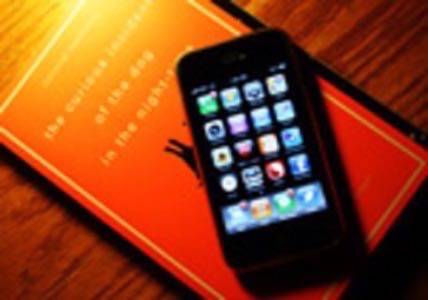As technology becomes more a part of our day-to-day lives, some are worried that it is stunting the education of children by taking away time from activities like reading. A startling discovery from the London-based National Literacy Trust finds that children are more likely these days to own a cell phone than they are a book. The study, which NLT will publish next week, ties cell phone penetration to the presence of books in a child’s home, but are these conclusions fair to draw?

A survey of 17,000 U.K. children between the ages of 7 and 16 found that while 86% owned a cell phone, only 73% said they owned a book. The NLT believes a child’s access to books has a direct effect on their reading ability, finding that 80% of children reading at their expect levels have their own books. Conversely, the same can only be said for just 58% of children not reading up to par with their age group.
“Our research illustrates the clear link with literacy resources at home and a child’s reading ability,” said Jonathan Douglas, Director of the NLT. “By ensuring children have access to reading materials in the home and by encouraging children to love reading, families can help them to do well at school and to enjoy opportunities throughout their life.”
The connection between books and cell phones in the hands of children is a strange one for the NLT to make. In the press release announcing the study, NLT does not define what they consider to constitute “owning a book,” – a significant factor that could change the way readers interpret the study. There are, however, ways to help the literacy problems by taking advantage of the popularity of mobile devices.

While children certainly seem more interested in chatting with friends on their phones than sitting quietly and reading a book, some argue that this debate shouldn’t become about the media which children consume. Teacher and education blogger Vicki Davis told ReadWriteWeb that she believes kids benefit from reading on phones or computers as much as they do from paper.
“Whether on a mobile phone, iPod, Kindle, or handheld device or paper – the medium should be irrelevant. The important thing is that students can read and write, or in this case read and text,” said Davis. “If ancient man had demanded that their children continue to use their tools – we would still be looking for cave walls to draw upon – paper has been an essential tool of the mass-produced industrial age and electronics are the essential produce of the interconnected information age. Education needs to wake up and harness these tools for learning!”
Redefining “Reading”
Michelle Manafy, editorial director at Information Today, says older generations need to open up their definitions of what “books” actually are. “The very notion of literacy and reading itself has evolved beyond the capacity of many who grew up with linear reading experiences to understand,” she says.
“If every kid has a phone, then maybe we need to be looking much harder at creating content optimized for this reading environment, to creating a reading experience that coincides with their voracious appetite and shorter attention spans, with their tangentially and serendipitously connected non-linear reading style and socially mediated tastes,” said Manafy
Mobile technology blogger Jason Harris agrees with Davis and Manafy, and adds that the drop in reading skills are likely due to a combination of factors.
“The world is changing in that mobile phones are falling into the hands of new populations, including young children,” said Harris. “Of course, there’s a competition for time in this age group, so if they’re on their mobile phones then all leisure activities, including reading, will take a hit. But are reading scores falling because of this one factor? I doubt it.”
Are Parents to Blame?
Marnie Webb, co-CEO of TechSoup Global says the technology is not to blame for the decline in reading skills. As she puts it, the onus is on the parents to make sure the kids have the same access to books as they do phones.
“It doesn’t have to be an either or. We can’t make it an either or,” says Webb. “But that seems to me to be up to grownups […] I have to put the books in the kid’s pocket. Just like we put the phone in the kids’ pockets.”
Agreeing with Webb is Peggy Anne Salz, founder of MSearchGroove.com, a leading blog on mobile search. Salz says the report is “a call to parents to participate in their children’s education, a process they can only improve and enhance with anytime, anywhere mobile access to educational materials.”
“Read between the lines, and this is not about a connection between children having a mobile device and any drop in grade school literacy skills,” adds Salz. “The report argues there is a link between having literacy resources at home and a child’s reading ability. That’s an access issue that mobile devices can solve for children in the U.K. and around the world.”
It is certainly true that mobile handset penetration is reaching a younger and younger audience, but that is not necessarily a direct catalyst to lowering reading scores. Whether the presence of books in a home affects a child’s ability to read is another argument, but it seems strange to try and hook that on mobile phone usage. As technology evolves, so too will the way kids “read” and consume information, so basing studies on the presence of older forms of information digestion may become less and less appropriate.
UPDATE: I received a response after reaching out on Twitter to LeVar Burton, known famously for his love of reading and as the host of the children’s show Reading Rainbow. What did the book lover think of the fact that more children own phones than books? “I believe kids need both,” he said.
Photo by Flickr user eyeliam.




















